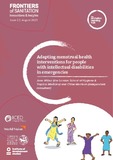| dc.contributor.author | Wilbur, Jane | |
| dc.contributor.author | Morrison, Chloe | |
| dc.coverage.spatial | Nepal | en |
| dc.coverage.spatial | Vanuatu | en |
| dc.date.accessioned | 2023-07-31T12:30:08Z | |
| dc.date.available | 2023-07-31T12:30:08Z | |
| dc.date.issued | 2023-08 | |
| dc.identifier.citation | Wilbur, J. and Morrison, C. (2023) ‘Adapting Menstrual Health Interventions for People with Intellectual Disabilities in Emergencies’ Frontiers of Sanitation: Innovations and Insights 22, The Sanitation Learning Hub, Brighton: IDS, DOI: 10.19088/SLH.2023.012 | en |
| dc.identifier.isbn | 978-1-80470-127-0 | |
| dc.identifier.uri | https://opendocs.ids.ac.uk/opendocs/handle/20.500.12413/18064 | |
| dc.description.abstract | The Bishesta campaign – a menstrual health intervention for people with intellectual disabilities and their caregivers in Nepal, was developed to help improve menstrual health for this population in non-humanitarian settings (Wilbur et al. 2021a). The campaign was developed by the London School of Hygiene & Tropical Medicine (LSHTM) and WaterAid and delivered in collaboration with the disability service provider, the Down Syndrome Society Nepal, and the Centre for Integrated Urban Development, a local WASH non-government organisation.
Following a positive feasibility study (Wilbur et al. 2019a), the Bishesta campaign was ready for efficacy testing or adapting for another context. Due to the lack of attention to people with disabilities’ menstrual health during emergencies, World Vision and the LSHTM adapted the Bishesta campaign for humanitarian responses in Vanuatu and called it the Veivanua campaign.
This Frontiers of Sanitation issue presents: the research that preceded the development of these campaigns, the two campaigns, explains the adaptation process, and documents critical considerations for others wishing to revise the campaigns for different settings. This issue will interest practitioners working in menstrual health for people with and without disabilities in the development or humanitarian context. | en |
| dc.description.sponsorship | Sida | en |
| dc.description.sponsorship | Elrha’s Humanitarian Innovation Fund (HIF) programme | en |
| dc.language.iso | en | en |
| dc.publisher | The Sanitation Learning Hub, Institute of Development Studies | en |
| dc.relation.ispartofseries | Frontiers of Sanitation;22 | |
| dc.rights.uri | http://creativecommons.org/licenses/by-nc/4.0/ | en |
| dc.subject | Education | en |
| dc.subject | Gender | en |
| dc.subject | Health | en |
| dc.subject | Participation | en |
| dc.subject | Rights | en |
| dc.title | Adapting Menstrual Health Interventions for People with Intellectual Disabilities in Emergencies | en |
| dc.type | Series paper (non-IDS) | en |
| dc.rights.holder | © Institute of Development Studies 2023 | en |
| dc.identifier.externaluri | https://sanitationlearninghub.org/resource/adapting-menstrual-health-interventions-for-people-with-intellectual-disabilities-in-emergencies/ | |
| dc.identifier.doi | 10.19088/SLH.2023.012 | |
| dcterms.dateAccepted | 2023-08 | |
| rioxxterms.funder | Default funder | en |
| rioxxterms.identifier.project | The Sanitation Learning Hub | en |
| rioxxterms.version | VoR | en |
| rioxxterms.versionofrecord | 10.19088/SLH.2023.012 | en |
| rioxxterms.funder.project | 5e50f69d-6102-4a66-b12d-49ceb02612b0 | en |


